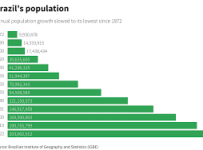Introduction:
Brazil, renowned for its vibrant culture, stunning natural landscapes, and dynamic economy, has emerged as an attractive destination for international students seeking quality higher education opportunities. With a diverse array of universities and colleges offering a wide range of academic programs, Brazil stands out for its commitment to providing accessible and affordable education to students from around the world. In this comprehensive guide, we explore the options available to international students interested in studying tuition-free at Brazilian universities.
Overview of Higher Education in Brazil:

Brazil’s higher education system is characterized by a mix of public and private institutions, with public universities typically offering tuition-free education to both domestic and international students. These public universities, funded by the government, are known for their academic excellence, research output, and commitment to social inclusion.
Public universities in Brazil are governed by the Ministry of Education (MEC) and are subject to rigorous quality assurance and accreditation processes to ensure compliance with national standards and regulations. These institutions offer a wide range of undergraduate, graduate, and doctoral programs across various disciplines, catering to the diverse interests and career aspirations of students.
Tuition-Free Universities for International Students:

While tuition fees are generally waived for international students at public universities in Brazil, it’s essential to note that there may still be additional costs associated with enrollment, such as registration fees, administrative fees, and living expenses. However, compared to many other countries, the overall cost of studying in Brazil remains relatively affordable, making it an attractive option for international students seeking a high-quality education without breaking the bank.
One of the most prestigious and well-known tuition-free universities in Brazil is the University of São Paulo (USP), located in the vibrant city of São Paulo. Founded in 1934, USP is consistently ranked among the top universities in Latin America and offers a wide range of academic programs across various disciplines, including arts, sciences, engineering, and humanities. International students interested in studying at USP can take advantage of its diverse academic offerings, state-of-the-art research facilities, and vibrant campus life.
Another prominent tuition-free university in Brazil is the University of Brasília (UnB), located in the capital city of Brasília. Established in 1962, UnB is renowned for its interdisciplinary approach to education and research, with a strong emphasis on social justice, sustainability, and innovation. International students at UnB have access to a diverse array of academic programs, research opportunities, and extracurricular activities, making it an ideal destination for those seeking a holistic educational experience.
In addition to USP and UnB, several other public universities in Brazil offer tuition-free education to international students, including the Federal University of Rio de Janeiro (UFRJ), the Federal University of Minas Gerais (UFMG), and the Federal University of Paraná (UFPR), among others. These institutions provide a supportive learning environment, world-class faculty, and ample opportunities for academic and personal growth, making them highly desirable destinations for international students from around the globe.
Application Process and Requirements:
International students interested in studying at tuition-free universities in Brazil must fulfill certain eligibility criteria and follow specific application procedures outlined by each institution. While requirements may vary depending on the university and program of study, typical application requirements for undergraduate programs include:
- Academic transcripts from previous educational institutions
- Proof of proficiency in Portuguese or English (depending on the language of instruction)
- Standardized test scores (such as the SAT or ACT)
- Letter(s) of recommendation from teachers or professors
- Statement of purpose outlining academic and career goals
- Passport and visa documentation
- Proof of financial support to cover living expenses
For graduate and doctoral programs, additional requirements may include a research proposal, writing samples, and interviews with faculty members. It’s essential for international students to carefully review the application guidelines and deadlines for each university and program to ensure a smooth application process.
Living and Studying in Brazil:
Studying abroad in Brazil offers international students a unique opportunity to immerse themselves in a vibrant and culturally rich environment while pursuing their academic and career goals. From bustling metropolises like São Paulo and Rio de Janeiro to tranquil coastal towns and lush rainforests, Brazil offers something for everyone, whether you’re interested in exploring vibrant urban culture, relaxing on pristine beaches, or discovering the wonders of the natural world.
While the official language of instruction at most Brazilian universities is Portuguese, many institutions offer academic programs and courses in English to accommodate international students. However, proficiency in Portuguese is highly recommended for international students planning to study in Brazil, as it will not only enhance their academic experience but also facilitate cultural integration and communication with local communities.
In terms of living expenses, Brazil offers a relatively affordable cost of living compared to many other countries, particularly in terms of accommodation, transportation, and dining. International students can choose from a variety of housing options, including university dormitories, shared apartments, and homestays, depending on their preferences and budget.
Moreover, Brazil’s rich cultural heritage, diverse cuisine, and vibrant arts scene provide endless opportunities for exploration and discovery outside the classroom. From attending colorful carnival celebrations and samba performances to sampling traditional Brazilian cuisine and exploring historical landmarks, international students will find no shortage of exciting experiences to enrich their time in Brazil.
Conclusion:
Studying at a tuition-free university in Brazil offers international students an unparalleled opportunity to pursue higher education in a dynamic and culturally diverse environment. With a wide range of academic programs, state-of-the-art research facilities, and supportive learning communities, Brazilian universities provide students with the knowledge, skills, and experiences needed to succeed in an increasingly interconnected world.
By carefully researching the available options, understanding the application process and requirements, and embracing the unique opportunities and challenges of studying abroad, international students can embark on a transformative educational journey in Brazil that will shape their lives and careers for years to come. Whether you’re interested in exploring the vibrant culture of Brazil’s urban centers, immersing yourself in the wonders of its natural landscapes, or engaging with cutting-edge research and innovation, studying at a tuition-free university in Brazil promises to be an experience like no other.


